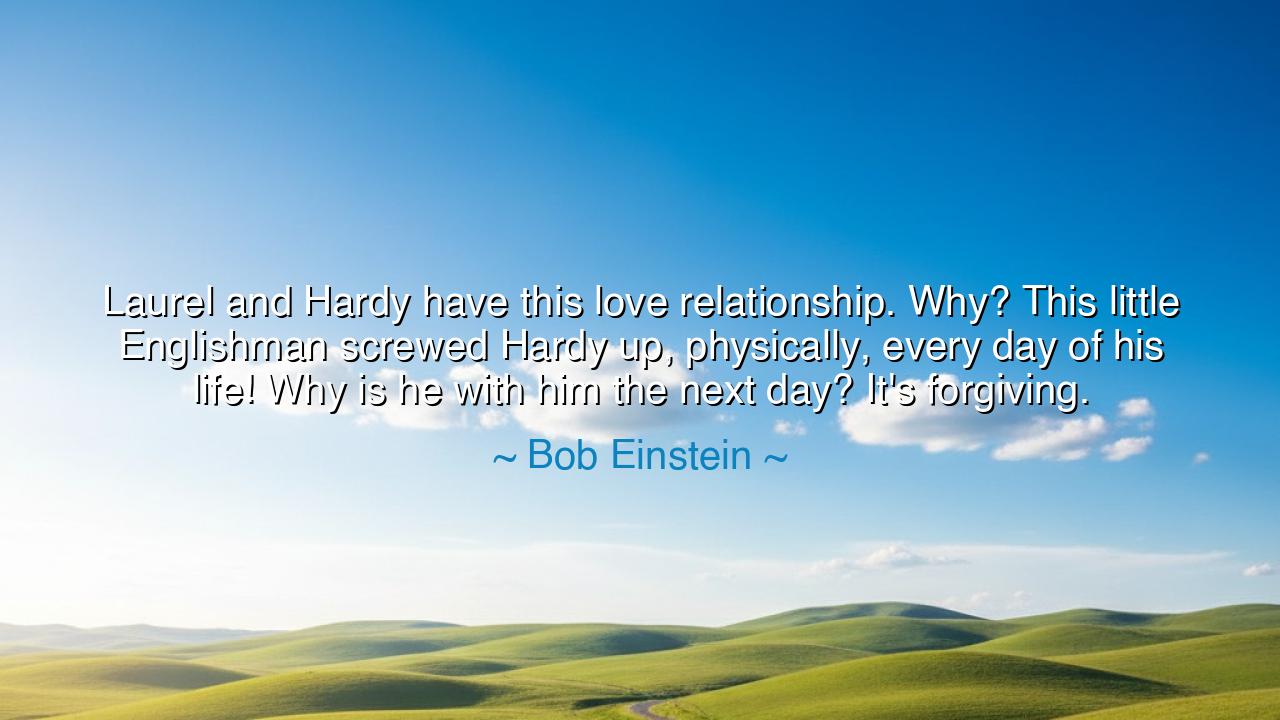
Laurel and Hardy have this love relationship. Why? This little
Laurel and Hardy have this love relationship. Why? This little Englishman screwed Hardy up, physically, every day of his life! Why is he with him the next day? It's forgiving.






The words of Bob Einstein speak with both humor and deep wisdom: “Laurel and Hardy have this love relationship. Why? This little Englishman screwed Hardy up, physically, every day of his life! Why is he with him the next day? It’s forgiving.” At first, they sound like jest, as though one were laughing at the clumsy antics of two comedians. Yet within them lies a profound teaching about the nature of human bonds: that love does not endure because pain is absent, but because forgiveness is ever-present. The laughter of Laurel and Hardy was born from the bruises, tumbles, and chaos they inflicted upon one another—yet the bond survived, even thrived, because of forgiveness.
Laurel and Hardy, those clowns of the silver screen, became symbols of comic absurdity. One was the bumbling fool, the other the exasperated victim. Day after day, scene after scene, the larger man bore the chaos caused by the smaller, and yet he returned the next morning with the same loyalty, the same partnership, the same quiet affection beneath the humor. In truth, their story reflects the greater drama of human relationships: we hurt one another, often without malice, and yet we remain, because love and forgiveness bind us more strongly than pain divides us.
Consider the ancient story of Aeschylus’s Oresteia. In its final act, Athena declares that vengeance shall no longer rule mankind, but forgiveness and law will replace the endless cycle of blood. This was no mere myth—it was a turning point in the moral imagination of the Greeks. Just as Hardy returned to Laurel not with vengeance but with tolerance, so too must mankind learn to forgive if we are to endure together. Without forgiveness, no bond—whether of friendship, marriage, or nation—can survive.
History, too, gives us noble examples. Recall Abraham Lincoln, who in the bitter aftermath of the Civil War chose reconciliation over retribution. He was urged by many to punish the South, to exact vengeance upon his enemies. Yet his words rang out like a hymn of compassion: “With malice toward none, with charity for all.” He saw that only forgiveness could knit the torn fabric of a nation. Like Hardy, beaten down but still returning to his partner, Lincoln knew that enduring love—whether between two men or two halves of a country—demands the courage to release resentment.
Einstein’s words remind us that humor itself is a temple of forgiveness. Why do we laugh when one man stumbles and the other suffers? Because we know it is safe, because deep beneath the chaos there is trust, friendship, even affection. Without that hidden bond, the comedy would be cruelty. But in Laurel and Hardy, we glimpse something holy: the ability to endure the slapstick of life without abandoning one another. Laughter becomes the balm of forgiveness, and forgiveness becomes the soil in which love grows.
Thus the teaching for us, O seekers, is simple but demanding: cherish your bonds, even when they bruise you. In families, in friendships, in communities, there will always be slights, stumbles, and wounds. But if you cultivate the spirit of forgiving, you will rise the next day with love still alive. Do not cling to yesterday’s anger, for it is a poison that kills joy. Be like Hardy, who endures, and like Laurel, who is embraced despite his folly.
Practical action follows: practice forgiveness in the small things first. When your friend irritates you, when your partner fails you, when your colleague stumbles—choose patience instead of anger. Laugh where you might otherwise rage. Speak softly where you might otherwise strike. In doing so, you will find that relationships become not chains of resentment, but gardens of love. For love is not the absence of wounds—it is the willingness to forgive them.
So remember the wisdom hidden in comedy: the clumsy fall, the bruised pride, the frustrated sigh—all of these are made bearable through forgiveness. And as Bob Einstein has shown through the example of Laurel and Hardy, even the most battered soul can return the next day with affection if the heart is willing. Forgive often, forgive freely, and you will find that your bonds endure the blows of life and rise stronger with every fall.






KNKien Nguyen
Bob Einstein’s take on Laurel and Hardy is so insightful. It’s not just about the physical comedy; it’s about the bond they share, which is rooted in forgiveness. Can forgiveness really be the key to making any relationship work? How do you think people in real life can learn to embrace forgiveness in the way Laurel and Hardy did?
CTHa Thi Cam Thanh
This quote makes me reflect on the nature of relationships. The idea that Laurel constantly 'screws up' Hardy but still continues to show up the next day is a perfect example of love and loyalty. How much do you think humor or shared experiences contribute to the strength of relationships, especially when facing recurring difficulties?
QKTran Quoc Khanh
It’s interesting how Einstein emphasizes forgiveness in the context of Laurel and Hardy's dynamic. Their relationship, though comedic, seems to have deep roots in understanding and accepting each other's flaws. Do you think this kind of unconditional forgiveness is possible in real-life friendships, or is it something more unique to fictional characters?
NNThuong Ngo ngoc
Bob Einstein’s perspective on Laurel and Hardy’s relationship is fascinating. The idea that despite all the physical mishaps and constant chaos, there’s an underlying love and forgiveness speaks to the power of true friendship or partnership. Do you think forgiveness is what really keeps relationships strong, even when there are constant challenges or mistakes?